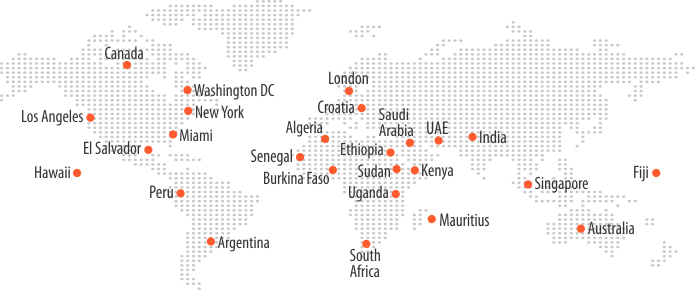Where is VoIP Heading with Emerging Technology

Over the last two decades, the global VoIP market has grown at an exponential rate. The industry displays no signs of decelerating, thanks to ongoing technological advancements, government support, and business adoption.
Voice over Internet Protocol (VoIP) began as a low-cost replacement for traditional landline and private branch exchange (PBX) systems. Call quality was lower than that of landline calls in the early days of VoIP. However, as digital technology, the quality has never ceased to improve. Over time, VoIP trends will provide business benefits that the early adopters of VoIP could only dream of—superior call quality, total integration, security, flexibility, and intelligence.
“VoIP Industry is expected to grow by around 12% by 2025.”
Let’s see the Factors Driving the Future of VoIP
5G Migration
All VoIP providers will have 5G technology by 2023, with some already transitioning from 4G to 5G. Because of its faster connectivity, low latency, improved quality, and ability to connect with a wide range of devices, 5G is making waves. With the ability to increase overall business productivity, 5G will be an invaluable asset for businesses, allowing them to attract customers and provide an enhanced user experience like never before.
Service Quality
Consumers purchasing new 5G-enabled smartphones believe the new generation is the same as the previous generation, only faster. However, it is much more than that, especially for VoIP calls. Not only will 5G networks handle peak usage far better than 4G networks, but they will also provide vastly improved packet prioritization, superior network availability, and improved reliability.
5G also supports network slicing, which is network virtualization combined with the allocation of computing resources to optimize performance. If improved network alternatives without help do not enhance your voice quality, 5G consists of an extremely adaptive high-definition voice CODEC called EVS that senses and adapts to network conditions in real time.
Integration with the IoT (Internet of Things)
As the Internet of Things expands, so will VoIP phones. This is because they can do so much more than just make and receive phone calls. There are numerous factors that must be considered. The future of VoIP phones, for example, is dependent on widespread connectivity. A strong and stable connection is required to ensure that VoIP phones function properly, especially with all the features they are capable of.
Omnichannel
The versatility of VoIP and future VoIP systems will assist organizations in breaking down silos and conveying a customer-centric communications plan. Since VoIP calls are data, the latest technologies will utilize that data to create an omnichannel strategy for a unified customer experience.
Next-generation VoIP will promote consistency regardless of where customers interact with the organization because it can convert call data into actionable, searchable text and make requests on social media, text, websites, and other channels accessible to the call center.
This provides visibility into all previous interactions with a customer across all channels, allowing for a seamless continuation of the conversation for the customer. Customer experience systems will be centered on VoIP technology as it develops to improve and unite businesses across the customer experience.
Cloud Computing
The cloud is a boon to both large and small businesses, providing much more than e-mail, telecommuting via VOIP calls, and other virtual modes of communication. In fact, cloud computing truly captures the essence of the internet: information storage and sharing. Most businesses will migrate from on-premises PBX to the cloud over the next few years, according to forecasters. This will provide HD audio quality, optimal scalability, and a unified communication system – without regard to location – across an entire organization.
Cybersecurity
In today’s technological world, cybersecurity is a top priority for both providers and businesses. When the right system monitoring tools and security measures are in place, cybersecurity can potentially become a manageable and less dangerous part of the business.
Businesses can’t afford to fall behind on trends and valuable tools in such a competitive market. VoIP is one of those trains that you should get on before it’s too late. Companies must be ready for technological advancements as they occur each month, not annually. While you cannot predict the future of VoIP, adequate preparations for your company’s VoIP foundation are critical to its future success.
Sentiment Analysis and Artificial Intelligence
The use of Artificial Intelligence (AI) in VoIP services is one of the most promising VoIP trends. AI-powered analytics, such as natural language processing-based sentiment analysis, can analyze every customer call and extract insights into how callers are feeling. It accomplishes this by analyzing the words spoken during a call to determine not only their meaning but also the emotions and opinions expressed, which are then classified and organized to make previously unstructured data actionable.
For businesses, this means a steady stream of data that can provide insights into the quality of your call center, the impact of advertising, and customer affinity for your products and services.
Goodbye, Traditional Phone System
According to Statista, 90% of households used landline phones in 2004, but as time passed, landline phones were reduced to half only in the United States in 2018.
However, the number of cell phones increased by 50% between 2004 and 2018, signaling that it was time for VoIP to take control of the communication medium.
Now, we can see cell phones with VoIP features in everyone’s hands for communication, which forces more businesses to invest in VoIP.
VoIP leads the pack in terms of support for chat, SMS, email, video calls, phone calls, and social media, as well as providing a variety of ways to communicate.
As a result, in 2023, we will see businesses continue to engage their customers through various platforms that will be an integrated way to connect with people and provide an excellent experience for VoIP channels.
Wrapping Up
VoIP telephony is an exciting new technology. This has influenced and improved different industries all over the world, and it will continue to do so. VoIP is emerging, improving work processes and employee performance. Due to integration with technological innovations such as 5G, AI, and IoT, the telecommunications industry’s development will be much better and faster.
The future of VoIP industry developments will provide significantly higher call quality and much better integration with the full suite of communication options used by businesses. Above all, they’ll be adaptable. Future VoIP will be scalable and offer customized options for different parts of the organization. That adaptability will extend to the device, with calls directed quickly to the appropriate person on phones, laptops, tablets, mobiles, and future platforms such as smart glasses.
If you have to discover more about how wholesale VoIP termination rates can help your business save money, Bankai Group is present here to serve you with the best possible rates.
Related Posts
Wholesale VoIP is What you’re Looking for in Telecom Partner
Top 10 VoIP Trends Powering Communications in 2023






